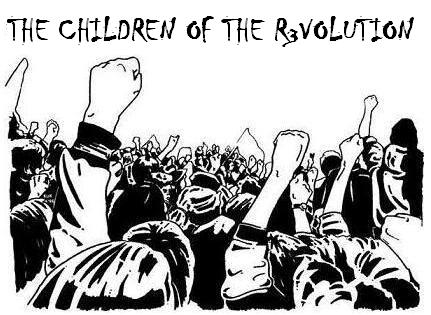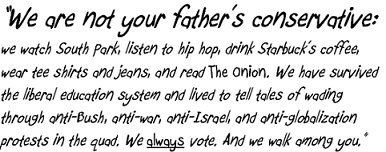BY SEACHRANAI
 I had no idea last week's brief primer on our economic problems would become so topical so quickly, but here we are. You may have just heard over the weekend, perhaps you heard the whispers and rumors at the end of last week, or maybe you are like most of Americans and it went in one ear and out the other. If you are the latter, pay extra special attention, because you should care. The Federal Government is nationalizing Fannie Mae and Freddie Mac. The decision was officially announced Sunday at 11 AM (the government’s financial regulators, unlike any other government employees, typically like to work on the weekends).
I had no idea last week's brief primer on our economic problems would become so topical so quickly, but here we are. You may have just heard over the weekend, perhaps you heard the whispers and rumors at the end of last week, or maybe you are like most of Americans and it went in one ear and out the other. If you are the latter, pay extra special attention, because you should care. The Federal Government is nationalizing Fannie Mae and Freddie Mac. The decision was officially announced Sunday at 11 AM (the government’s financial regulators, unlike any other government employees, typically like to work on the weekends).What does this mean to you? Well, as the term implies, the companies will become part of the federal government. And who funds the federal government? Well you do, silly. That means any further losses the companies incur will be paid for by you. One must give the government some credit, however. Under the current scenario, existing shareholders will be wiped out too – so at least a portion of the losses will fall on those who benefited from the earnings the GSE’s reaped prior to their collapse. The government could have merely propped the entities up with taxpayer money while leaving existing public shareholders in place, in which case you would still be paying for the losses, but those that benefited from before the current mess would have gotten away scot free – a true redistribution of wealth if ever there was one.
The nationalization scenario has cutely been dubbed the “bazooka” option by the media. Appropriately so, because it uses existing banking regulations to allow the federal government to come in, wipe out management and shareholders (effectively “blowing up” the existing ownership structure) and scoop the companies into full regulatory receivership. I feel this name is lacking, however. A bazooka is an inherently destructive device, but is intended to only destroy the target at which you point it. The nationalization scenario (which was debatably the only viable option truly left on the table) does much more than that. We have all heard the term “nuclear option” before, and I believe this is a far more adequate description of nationalization. I choose this terminology for a reason. Much like detonating a nuclear device, this policy action is going to generate a great deal of “fallout”.
Like I said before, GSE stockholders will be punished. Our country’s banks (yes, those companies which hold all our wealth and have already been put under serious strain recently) own a good deal of common and preferred GSE stock. For some, these securities actually make up a material amount of their capital base. The “fallout” from our nationalization scenario, thus, is that a major piece of capital on bank balance sheets is going to disappear (for those of you that are not so savvy in the lingo, we call this a “write-down” – now try and keep up). Fortunately, a lot of this stock has already been written down, but there is a lot of value out there (especially in the preferred stock), that has yet to really be effected.
Ultimately what does this mean? In the most serious of circumstances, the value of the bank’s assets becomes less than the value of the bank’s liabilities and boom – bank failure. Expect to see this more than once in the months to come. In a practical sense what should this mean to you? Let’s just say this – the FDIC only insures you up to $100,000 for deposits in a single bank. If you are lucky enough to have more than that at one bank, move anything over $100,000 somewhere else – then at least you are covered. I cannot say whether or not we will see the mortgage giants continue as national entities into the future ad infinitum, or if we will try and establish a more fair, more stable system of public ownership going forward. What I can say is that at present, the weight of these behemoths in on all of our backs – let’s hope it isn’t too much for us to carry.







4 comments:
To be fair, Mr Tony underestimates the FDIC protection limits. While there are some individuals who need to be seriously reconsidering their financial situation, individuals are actually protected up to $100,000 per qualifying account. This means that there is actually a considerable amount of wiggle room for using creatively structured deposits to protect your money without spreading your risk across multiple banks. To be fair, the FDIC at least has attempted to make this information available
I think it's time we start talking about the other 300 pound gorilla in the room, the possibility of foreign-owned banks investing in American infrastructure and bailing us out of this crisis. Raises serious issues, but I'm hearing some financial nitwits argue for it more and more.
Oh yeah, because I'd love to pay my future mortgage directly to the Bank of Dubai, rather than having them buy my debt on the secondary market. Sure.
Is he kidding?
No, THEY are not kidding. The reason it needs to be discussed is that with the economy being issue number one and people hurting, politicians (read: demagogues) are going to start looking at this as a quick solution to our woes, but one that has long-lasting negative effects. Kind of like social security.
My opinion is that while foreign investment in the US arguably gives those government a stake in our success, it also gives them leverage to ensure our failure. To me it's a simple national security issue, but to some "economic gurus" it is, of course, much more "complicated" and worth "taking a look at," which invariably means they secretly want to enact the change as quickly as possible and with minimal public scrutiny or oversight.
Just sounding the alarm and advising everyone to be ready to put the kibosh on this.
Post a Comment